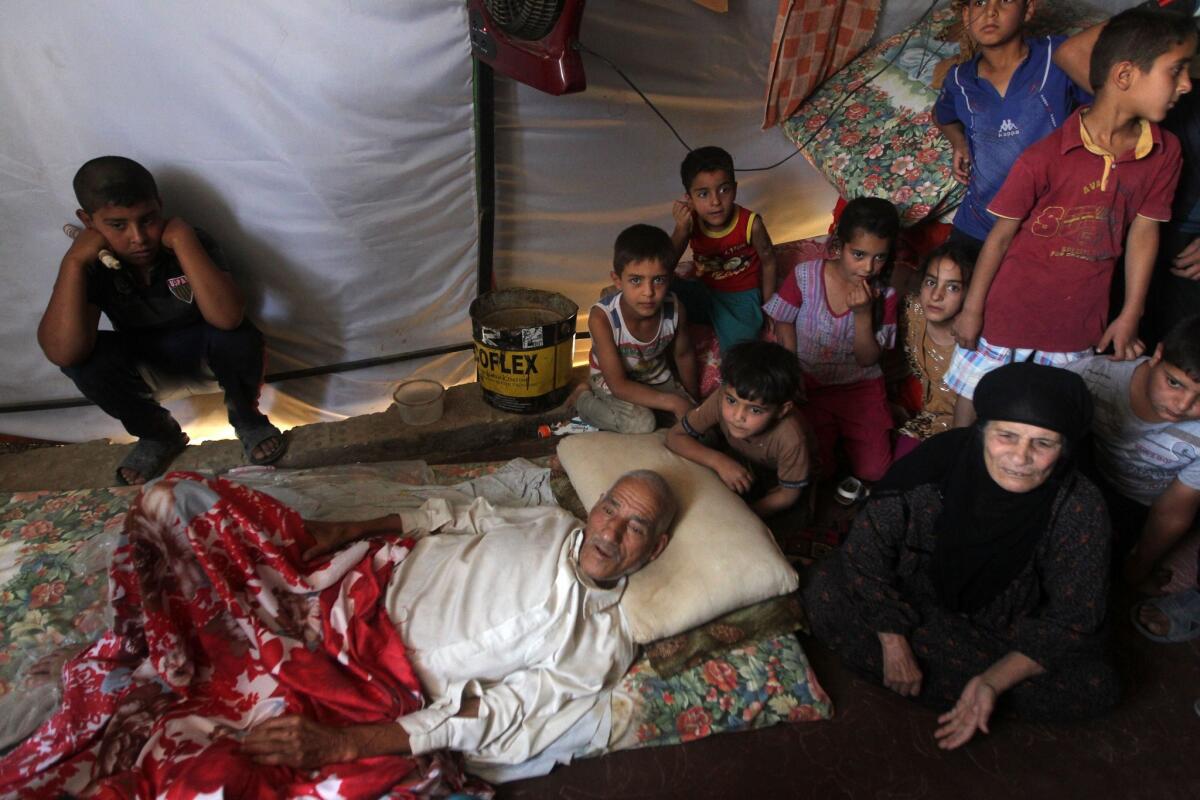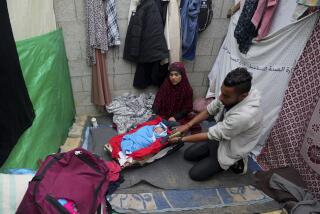Iraqi militias preparing to take on Islamic State in Ramadi

An Iraqi family that fled the city of Ramadi after it was seized by
Reporting from Beirut — Thousands of Iraqi paramilitary fighters were mobilizing for a fresh assault on the western province of Anbar on Monday, one day after Islamic State militants overran the provincial capital, Ramadi, dealing a major strategic and symbolic blow to the U.S.-backed central government in Baghdad.
The U.S.-led coalition conducting an air war against Islamic State stepped up bombardment in the Ramadi area, as Secretary of State John F. Kerry said an imminent counteroffensive would eject the militants from the long-embattled city about 60 miles west of Baghdad, the capital.
“I am absolutely confident in the days ahead that will be reversed,” Kerry said at a news conference in Seoul, referring to the fall of Ramadi.
The loss of the city also resonated with many American veterans of the Iraq war and their families, who came to know Anbar province as the perilous hub of the Sunni Arab insurgency against U.S. occupying forces. Americans suffered hundreds of casualties fighting in Ramadi and other stretches of the vast desert province, including the nearby city of Fallouja, which has also fallen back into militant hands.
Ramadi has proved to be an awkward setback for Prime Minister Haider Abadi’s government and its U.S. supporters, who have been declaring for months that Islamic State has been on the run. The militant advance in Ramadi seemed to suggest a less upbeat reality.
The widely disseminated images of Iraqi forces in rapid retreat from Ramadi in U.S.-made Humvees and of militants celebrating their triumph were reminiscent of images that emerged last year, when Islamic State fighters overran broad parts of northern and western Iraq, stunning the world.
Once again, reports indicated that extremists had seized caches of weapons and ammunition left behind by fleeing Iraqi forces and had begun executions of captured government loyalists. Officials said they feared a bloodbath of retribution had begun.
Abadi ordered the Iraqi militias to prepare to go into Anbar.
Analysts said retaking Ramadi would probably require a drawn-out battle against a highly motivated and heavily armed Islamic State force that has considerable support from the local population, which is mostly Sunni and generally hostile toward the Shiite Muslim-led central government.
The situation in Ramadi dramatized the continued strength of the militants despite nine months of U.S.-led airstrikes targeting Islamic State positions in Iraq, as well as various Iraqi military operations against the group. Islamic State has been largely driven out of two other Iraqi provinces, Salahuddin and Diyala, and has suffered territorial setbacks in northern Iraq’s Kurdish region.
Anbar province, which accounts for almost a third of Iraq’s land area, is a key strategic link and supply corridor to Islamic State strongholds in neighboring Syria. Anbar also borders Jordan and Saudi Arabia.
After its victory in Ramadi, Islamic State also released pictures of jubilant fighters handing out candy to children. A series of photos distributed on the Web purported to show inmates, presumably jailed militants, being released from a prison in Ramadi. The images show the liberated captives embracing fighters after the gunmen shot the locks off the prison doors.
The latest developments and Islamic State’s continued dominance in much of Anbar province again demonstrate the sectarian divide that has largely come to define Iraq since the U.S.-led 2003 invasion overthrew Saddam Hussein, a Sunni who was popular in Anbar, a predominantly Sunni area.
Many Iraqi Sunnis continue to chafe under the rule of a Shiite-dominated government, viewing Sunni militants as a preferable alternative despite Islamic State’s harsh rule.
“It is only the Sunnis who can truly defeat ISIS, and there needs to be a strategy that puts them as the center of gravity in the fight,” said Emma Sky, a senior fellow at Yale University’s Jackson Institute for Global Affairs, using a common acronym for the extremist group.
“They will turn against ISIS when they see it cannot win, that there are better alternatives,” said Sky, the author of “The Unraveling: High Hopes and Missed Opportunities in Iraq.”
The Iraqi government has attempted to recruit Sunni fighters to its ranks, boasting of the participation of Sunni tribal volunteers in the campaign against Islamic State. But, as Baghdad prepares a counteroffensive in Anbar, the government is again turning to Shiite militias, many backed by Shiite Iran.
In a statement released Monday, the Anbar Provincial Council declared that about 3,000 militiamen from the Shiite-dominated Hashd al-Shaabi, or Popular Mobilization Units, had reached the Habbaniya base, 18 miles east of Ramadi. They join two regiments comprising 1,000 Sunni tribesmen from Ramadi who had just completed their training at the base and would also participate in the assault on Ramadi, according to the statement.
Jaafar Husseini, spokesman for the Iraqi militia Hezbollah Brigades, said more than 4,000 of the group’s fighters would also be joining the battle.
“Our fighters will arrive either today or tomorrow, and of course we are also bringing in heavy armor,” Husseini said in a telephone interview Monday.
As of Monday, hundreds of tribal fighters and residents of the Ramadi area had been executed by the militants, according to Hikmat Suleiman, spokesman for Anbar Gov. Suhaib Rawi.
The fighting in Ramadi has displaced thousands of residents, according to Anbar officials, who said that many are barred from entering Baghdad as well as the Shiite-dominated provinces to the south because they are suspected of collaborating with Islamic State.
The massing of the Shiite militias began after Islamic State declared Sunday that Ramadi was under its control following a three-day onslaught.
The U.S.-led coalition said in a statement Monday that it conducted eight strikes on Ramadi early Sunday against Islamic State positions. Nevertheless, video released later by the pro-Islamic State Aamaq News Agency depicted militants leisurely making their way among the charred hulks of destroyed armor in an abandoned thoroughfare of Ramadi before unfurling the group’s black-and-white flag and hanging it on a street sign.
Twitter: @mcdneville
Bulos is a special correspondent.
More to Read
Sign up for Essential California
The most important California stories and recommendations in your inbox every morning.
You may occasionally receive promotional content from the Los Angeles Times.









